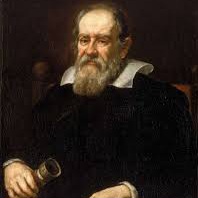Early Life and Education - The Origins of an Inquisitive Mind
Galileo Galilei was born on February 15, 1564 in Pisa, Italy. Even from a young age, his curiosity about the world around him was evident. As a child, Galileo would question everything - from why the moon changed shape to how pendulums kept time. His parents encouraged his inquisitive nature, giving him the freedom to tinker, explore, and conduct experiments at home. Galileo never lost this childlike sense of wonder, attributing many of his later discoveries to hours spent patiently observing phenomena that most took for granted.
 |
| Galileo Galilei |
At age 11, Galileo entered a monastery school, where he was exposed to formal education for the first time. Though he showed talent in art and music, he found himself gravitating towards the sciences and mathematics in particular. Galileo once wrote in a letter, “I was never able to discover anything better than the arithmetical proofs, in which there are no words to seduce you away from the truth.” Through asking “why” over and over, Galileo laid the early groundwork for the rational, evidence-based approach that would come to define his seminal work.!
Revolutionary Discoveries in Astronomy - Challenging Long-Held Beliefs
As a professor of mathematics at the University of Padua, Galileo pioneered modern observational astronomy. While most accepted the prevailing Aristotelian and Ptolemaic models of the heavens, Galileo felt that the key to truth lay in conducting experiments. He improved the recently invented telescope, enabling him to make seminal observations that would contradict established doctrines.
Galileo discovered that the moon, far from being a perfect sphere, was cratered and mountainous. His observations of the phases of Venus directly challenged the Aristotelian model of the heavens. Most significantly, Galileo discovered four moons orbiting Jupiter - the first observed satellites of another planet. At the time, doctrine held that all celestial bodies orbited the Earth. Galileo wrote to Kepler saying, "I have obtained this result: the universe is not contained between the narrow walls and the restricted measures of Ptolemy’s cosmos.”
While findings that seem intuitive today provoked vicious attacks in Galileo's time, he retained his characteristic confidence and enthusiasm. When charged with heresy for his heliocentric views, Galileo responded “I do not feel obliged to believe that the same God who has endowed us with sense, reason, and intellect has intended us to forgo their use.” Through a long career of meticulous observation, ingenious experimentation and fearless theorization, Galileo paved the way for the scientific revolution.
Persecution and Controversy - Standing Firm for Truth
While Galileo's discoveries brought him renown in scientific circles, they also made him many enemies among theological authorities. As he promoted the Copernican model of the solar system that placed the Sun, not Earth, at the center, Galileo encountered immense backlash. He was first warned by Cardinal Bellarmine on behalf of the Catholic Church to abandon his beliefs in 1616. By 1633, he was brought before the Inquisition under charges of heresy.
Rather than recant his theories, Galileo remained certain in his convictions born of careful observation and experimentation. At his trial, legend holds that he uttered under his breath “And yet it moves,” showing his refusal to deny what he determined as scientific truth, even under threat of imprisonment or death. While Galileo did technically recant his theories, it is said he knew the truth would eventually prevail over doctrines unable to account for measurable phenomena.
Though Galileo was sentenced to house arrest for the remainder of his life, nothing could diminish his spirit of scientific inquiry. Even blinded and frail towards the end, he devoted himself to publications on physics, engineering projects, and tutoring students from his villa. As evidenced by history, Galileo was correct that facts rooted in reality could not be suppressed, no matter how controversial initially. His courage to follow evidence to conclusions vastly at odds with those of powerful institutions is an inspiration for freethinkers across every generation.
Legacy as the Father of Modern Science - Inspiring Curiosity and Discovery for Centuries
While controversial in his time, Galileo's impact on the advancement of science cannot be overstated. Through a lifetime of improvements to the telescope, ingenious experiments, masterful theoretical treatises and an unwavering commitment to following facts, Galileo pioneered the scientific method itself.
Beyond his revolutionary astronomical observations and support for the heliocentric model, Galileo made seminal contributions to physics with quantitative descriptions of motion and concepts like acceleration still taught today. He set the stage for the widespread acceptance of mathematics as the language of science, rather than a philosophical pursuit removed from physical reality.
Galileo once wrote, "All truths are easy to understand once they are discovered; the point is to discover them." To that end, he dedicated his life not just to uncovering new truths about the cosmos, but about how such Universal laws could be discerned using reason, measurement and deduction. Every astronomer peering through a telescope, physicist solving an equation or citizen questioning established fact follows in Galileo's footsteps.
Through his vast contributions, Galileo lit the spark that ignited the Scientific Revolution. While long denied by institutions eager to silence progress, Galileo's spirit of rational and fearless inquiry could not be restrained. Centuries later, he remains an inspiration for all who dare to observe, question and help humanity separate doctrine from measurable reality. Science continues marching forward on a path first trod by that curious Italian boy gazing at the night sky over Pisa so long ago.